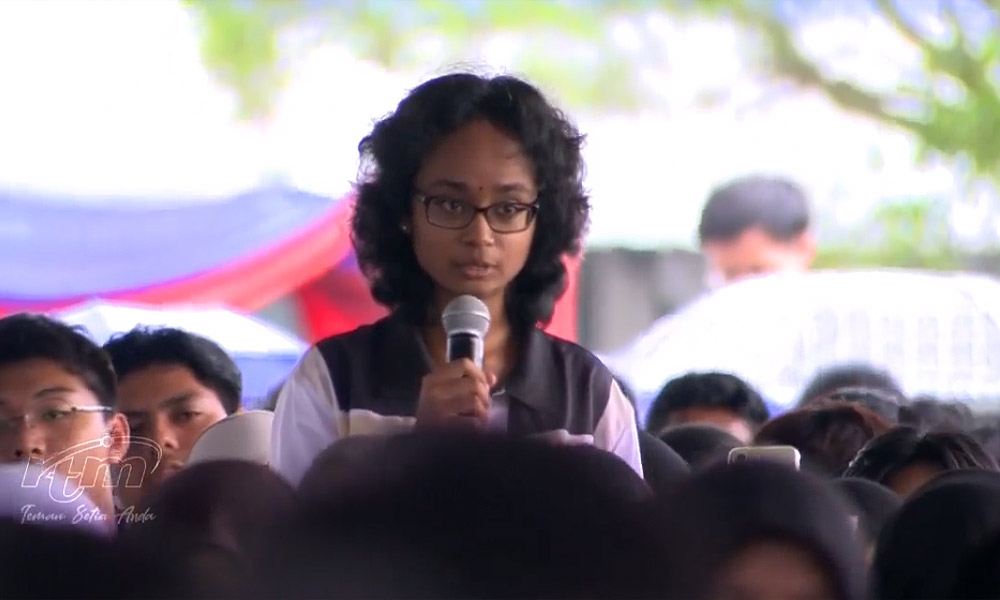It was reminiscent of the infamous “Listen, listen, listen” rant at the Universiti Utara Malaysia 10 years ago but Anwar Ibrahim’s riposte to a question from a student at Kolej Matrikulasi Pulau Pinang in Kepala Batas last week veered to a similar infamy.
The teenager who asked albeit politely about the quota system for places to pursue a matriculation course was not met with the same “I talk, you listen” notoriety but she was prevented from completing what she had come for – seeking answers from the prime minister himself.
“My friends and I, as well as others that are not known, are affected by this quota system, all because they don’t have bumiputera status,” she was heard saying in a video of the event posted on Anwar’s official Facebook.
However, Anwar cut her off before she could explain, saying he already understood the question and that he had previously answered a similar one.
After having watched the videotape, it would be pertinent to dismiss the allegation that Anwar bullied the questioner but to say she should have been treated better would be an understatement.
She was given a lecture, albeit a long one, on the so-called social contract, comparisons to kids from rural areas and a brief on how to avoid political suicide.
Anwar said: “If I wanted to satisfy you and say ‘scrap the quota system’, we will lose all elections and you will suffer more in this country run by PAS and Bersatu.
“Understand that, it is important to understand that. You have many non-Malays here, and there is no quick-fix solution.”

Anwar claimed he had addressed the issue two weeks previously, but let’s go back a bit further.
In 2008, then Selangor menteri besar and Pakatan Harapan secretary Khalid Ibrahim suggested that admission to the Universiti Institut Teknologi Mara (UiTM) be opened to non-Malays.
This, he had argued, would allow undergraduates to gain more exposure and be friendlier to people of other races.
All hell broke loose – UiTM undergraduates in several of its campus nationwide protesting for the remark which was seen by them as infringing on their rights. They described Khalid as a traitor who was willing to sell off the rights of his own race. Who came to his rescue?
At a ceramah during the Permatang Pauh, Anwar defended Khalid by saying that the suggestion was meant to improve the skills and knowledge of both Malays and non–Malay students in the university.
Students who excelled in studies, he thundered, should be given equal opportunities to pursue tertiary education and those students, regardless of race should have the chance to rise to the occasion and fulfil their potential.
He was then in the opposition and is now the leader of the government. Why has his stance changed?
Public perception of such a system
To his detractors, Anwar is a political chameleon changing his deportment and posture as the situation calls for. But he justifies it by saying “We will lose the elections.”
Will certainly agree with the affirmative policies and opportunities given to students who come from say the backwaters of Hulu Tembling or the interiors of Bario and Sarawak.

But it will certainly be painful and punishing to exclude non-Malays who performed brilliantly. And it does not speak well of the public perception of such a system.
But we have seen the same privileges being accorded to the well-heeled, the wealthy, and the titled. It makes a mockery of the system and when one can afford a million-ringgit house, he can do without the seven percent discount on account of being a bumiputera.
All these make a mockery of the system.
Many years ago, the chairperson of Mara defended the decision to accord a full scholarship for his daughter to pursue tertiary education overseas.
His defence was simple and straightforward: She is entitled to it.
The requirements of non-bumiputera are simple and straightforward - better access to the education system and better economic opportunity. Nothing more, nothing less.
No one in his or her right mind would demand the abolition of the system. What is required as a tweak would at least give bright young students a window of opportunity to excel and scale to greater heights.
Every year, thousands of Malaysians and their families are emigrating, thus losing their experience and talent which would have helped create a better Malaysia for all of us.
When working in London 12 years ago, I was told that there were at least 1,000 Malaysians working in the Square Mile – the financial district. One told me that there were 45 Malaysians, just on one floor of a merchant bank.
After having lost them, we spend millions trying to lure them to return. Why do they want to come back to a system which prevented them from a basic education? Why should they have to come to a system which classifies their status which is perceived as second-class?
Reduced income tax, discounts on excise duties on cars they bring home and other perks have been an exercise in futility. The success rate of Talent Corp will reveal the state of affairs.
This is a hypothetical question: If Malaysia goes to war, who will lead? A competent and proven general who has gone through the ranks or a general who has risen to the top because of the social contract? - Mkini
R NADESWARAN is a veteran journalist who writes on bread-and-butter issues. Comments: citizen.nades22@gmail.com.
The views expressed here are those of the author/contributor and do not necessarily represent the views of MMKtT.




No comments:
Post a Comment
Note: Only a member of this blog may post a comment.